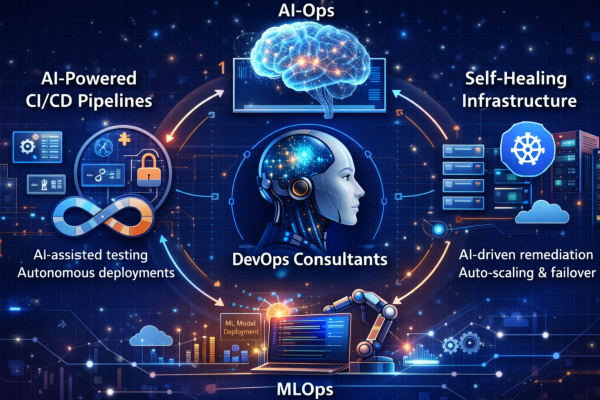How DevOps Consulting Services Accelerate Kubernetes Adoption
1. Architecting Enterprise-Grade Kubernetes Platforms
While many businesses can “spin up” a Kubernetes cluster, building an enterprise-ready platform requires expertise in:
- Multi-Cluster Design: Ensuring workload separation across regions and environments.
- Service Mesh Integration: Deploying Istio or Linkerd to handle secure service-to-service communication.
- Storage Strategies: Using CSI drivers for persistent volumes, dynamic provisioning, and data replication.
DevOps Consulting Services bring architectural blueprints refined through multiple implementations. Consultants know when to use managed services (EKS, AKS, GKE) versus self-managed clusters depending on business needs.
2. Container Lifecycle Management
Containerization simplifies application packaging, but managing containers at scale introduces operational overhead. Expert consultants provide:
- Optimized Image Pipelines: Building lightweight images, using multi-stage Docker builds, and embedding security scanning directly into CI/CD.
- Version Control of Containers: Implementing GitOps workflows with tools like ArgoCD or Flux for declarative deployments.
- Standardization Across Teams: Defining golden base images to reduce vulnerabilities and maintain consistency across applications.
With DevOps Consulting Services, organizations avoid bloated images, duplicate dependencies, and insecure container practices.
3. CI/CD Pipelines Tailored for Kubernetes
Generic CI/CD pipelines often break down in container-native environments. Consultants design pipelines that integrate seamlessly with Kubernetes:
- Canary & Blue-Green Deployments: Reducing risk by rolling out updates gradually.
- Automated Rollbacks: Leveraging Kubernetes health checks and Helm charts for quick recovery.
- Integration with IaC: Using Terraform and Helm to make the entire pipeline declarative and version-controlled.
By embedding Kubernetes-aware deployment strategies, DevOps Consulting Services ensure faster, safer software releases.
4. Security-First Container and Kubernetes Operations
Security is one of the most pressing concerns in containerized ecosystems. Consultants embed DevSecOps practices into every layer:
- Image Security: Integrating vulnerability scanning (Trivy, Aqua, Clair) into build pipelines.
- Secrets Management: Using HashiCorp Vault, Kubernetes Secrets encryption, or cloud-native KMS.
- RBAC Hardening: Designing least-privilege access across users, namespaces, and workloads.
- Policy Enforcement: Applying OPA/Gatekeeper or Kyverno to block non-compliant deployments.
Through DevOps Consulting Services, organizations transform Kubernetes from a “wild west” environment into a secure, compliant platform.
5. Observability and Performance Optimization
Containers and Kubernetes generate massive telemetry. Consultants implement modern observability stacks:
- Monitoring: Prometheus with custom alerting, scaling metrics, and long-term storage integrations.
- Logging: Centralized logging via ELK/EFK stacks, Loki, or cloud-native services.
- Tracing: Distributed tracing with Jaeger or OpenTelemetry to analyze microservice performance.
Beyond tools, DevOps Consulting Services fine-tune resource allocation by analyzing CPU/memory requests, horizontal pod autoscalers, and cluster auto-scaling strategies. The result? Lower infrastructure costs without sacrificing performance.
6. Scaling with Hybrid and Multi-Cloud Kubernetes
Organizations rarely run everything in a single environment. Consultants help orchestrate workloads across:
- Hybrid Deployments: Extending on-prem Kubernetes clusters with cloud-managed nodes.
- Multi-Cloud Workloads: Running Kubernetes clusters across AWS, Azure, and GCP with consistent governance.
- Disaster Recovery: Designing geo-redundant clusters with automated failover.
DevOps Consulting Services provide governance models that prevent cluster sprawl and ensure consistent deployments across all environments.
- Streamlining Developer Experience
Developers often face friction while adopting Kubernetes. Consultants enhance workflows with:
- Self-Service Platforms: Creating internal developer platforms (IDPs) on top of Kubernetes.
- Template Workflows: Providing Helm charts, YAML templates, and CLI tools to reduce complexity.
- Integrated DevSecOps Pipelines: Making security, compliance, and monitoring invisible to developers while still enforced by the platform.
This developer-centric approach ensures that Kubernetes adoption drives productivity, not frustration.
Business Impact of DevOps Consulting Services in Kubernetes
Technical improvements mean little without measurable business outcomes. Organizations that partner with expert consultants experience:
- Accelerated Time-to-Market: Streamlined CI/CD pipelines reduce release cycles from weeks to days.
- Operational Resilience: Kubernetes self-healing and automated rollbacks minimize downtime.
- Cost Efficiency: Optimized autoscaling and right-sized workloads save significant cloud spend.
- Regulatory Compliance: Built-in DevSecOps ensures PCI DSS, GDPR, and HIPAA requirements are consistently met.
- Future-Proof Infrastructure: Consulting services align Kubernetes adoption with AI, serverless, and edge computing trends.
Advanced Use Cases Driven by DevOps Consulting Services
- AI/ML Workloads: Running GPU-accelerated machine learning pipelines on Kubernetes clusters with custom resource definitions (CRDs).
- Edge Computing: Deploying lightweight Kubernetes (K3s, MicroK8s) for IoT and edge applications.
- High-Frequency Trading: Optimizing ultra-low-latency workloads with tuned networking and resource isolation.
- Global SaaS Platforms: Running multi-tenant clusters with namespace isolation, service mesh, and strict governance.
Such advanced implementations are often unachievable without DevOps Consulting Services that bring specialized knowledge and cross-industry experience.
The Future of Kubernetes and Containerization with DevOps Consulting Services
Looking ahead, Kubernetes will not only orchestrate containers but also serve as the foundation for:
- GitOps-Driven Operations: Full declarative management with automated reconciliation.
- AI-Augmented Orchestration: Machine learning models predicting scaling needs before spikes occur.
- Serverless + Kubernetes Integration: Knative and similar frameworks blending serverless workloads with container orchestration.
- Edge + 5G Deployments: Running distributed Kubernetes clusters on the edge to support real-time applications.
DevOps Consulting Services will remain critical in helping organizations navigate these emerging trends, ensuring that Kubernetes evolves as an enabler rather than a bottleneck.
Conclusion
Kubernetes and containerization are no longer experimental—they are the backbone of modern application delivery. Yet, without the right expertise, organizations risk spiraling complexity, mounting costs, and security blind spots.
DevOps Consulting Services provide the technical depth, proven frameworks, and operational excellence required to transform Kubernetes adoption into a strategic advantage. From architecture and automation to security and observability, consultants make Kubernetes ecosystems not just functional, but resilient, cost-efficient, and future-ready.
For organizations aiming to leverage Kubernetes and containerization to their fullest potential, investing in DevOps Consulting Services is not optional—it’s the smartest path forward.
Author







